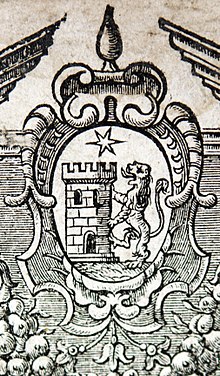Benveniste
| Benveniste | |
|---|---|
| Family name | |

Coat of Arms (Printer's Mark) of Immanuel Benveniste, Amsterdam 17th Century. It includes the Star of David, a lion cub of Judah a castle and 10 moons - the Kabbalist symbols of the 10 Sefirot (attributes/emanations). Probably the symbols in the Coat of Arms of Mendes/Benveniste families from Portugal and Spain
|
|
| Meaning | Latin "Bien veniste" and Spanish Bien venida = welcome (or Vien viniste = your arrival was good). |
| Region of origin | Spain, Greece, Israel, Turkey and the Old Ottoman Empire, Western Europe; |
| Language(s) of origin | Spanish, Ladino |
| Related names | Benvenist (in Catalonia),Vienveniste (in Castile), Bemvenist and Bemvenista (in Portugal), Benvenisti (in Italy),Beniste or Benisti (in North Africa), Bienveniste, Benbeneste, Beneviste, Benvenista, Benvenisto, Ben-Veniste, Vienveniste (in other places), |
Benveniste, is the surname, byname (see below - the origin of the name) in an old, noble, rich, and scholarly Jewish family of Narbonne, France and northern Spain from the 11th century. The family was present in the 11th to the 15th centuries in Provence, France, Barcelona, Aragon and Castile' Spain. Family members received honorary titles from the authorities and were members of the administration of the kingdom of Aragon and Castile. They were the Baillie ("Bayle") - the Tax Officer and Treasurer, Alfaquim - Senior Advisor to the King and Royal Physician in Barcelona and Aragon in the 12th and 13th centuries. They held the title of "Nasi" (prince in Hebrew), a name given to members of the House of David, in the Jewish communities (mainly Barcelona) and were prominent religious and secular leaders in the 11th to the 14th centuries. In the 14th to the 15th century they held the titles of "Vienveniste de la Cavalleria"—"of the knights" (a name given by the Templars to their treasurers and tax collectors) and Don—a noble person in Aragon and Castile. After the expulsion of the Jews from Spain in 1492 they were dispersed mainly to Portugal, Greece - Salonica other parts of the Turkish Empire and North African countries. In Portugal they were forced to convert to Christianity in 1497 and became one of the rich traders and bankers (the Mendes family) of Europe. Today the name is borne by families in Europe, the Americas, Asia and Israel. It was also used as a prænomen.
...
Wikipedia
